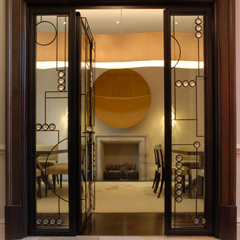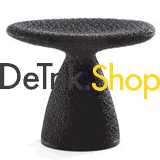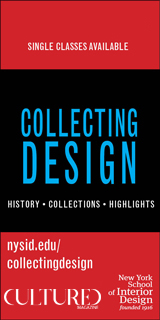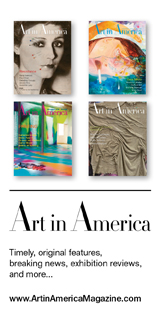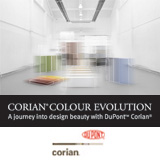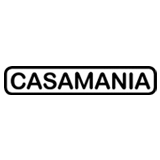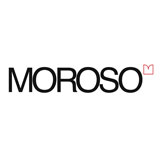Design Beyond Luxury by Emma Crichton-Miller
From the 2012 DeTnk Collectible Market Report
The second DeTnk report emerges at an interesting time for collectible design. On the one hand, the financial crisis appears to be deepening, with consequences for discretionary spending likely to be felt globally. On the other, the art market seems to rise ever higher above the fray, drawing the wealthy to invest with increasing enthusiasm in what appears a safe haven for capital. In this context, collectible design rests on the cusp: does it count as a luxury, an unnecessary though delightful flourish or adjunct to wealth? Or does it count as a repository of wealth, both cultural and financial, potentially a sound investment, but also a means of engaging with a central current of twentieth century and contemporary thought?
With the astonishing prices achieved for some iconic pieces of collectible design by the big names - Marc Newson, Ron Arad, Carlo Mollino, Eileen Gray - it can sometimes appear as if design has become subsumed into a notional luxury life-style, trumpeted in expensive glossy magazines and valued because it is expensive, rather than expensive because it is valued. This idea is sup- ported by anecdotal reports from the sales rooms of interior designers bulk buying pieces by prestigious designers to fill the homes of their clients. It is as if no contemporary interior worth its price tag is complete without a New- son sofa, Arad chair or shelving by Zaha Hadid. This is partly the nature of the beast of course. As Alexander Payne,World Wide Director of Design at Phillips de Pury & Company expresses it,“We attract both collectors of design and people seeking to furnish their homes - that differentiates us from other departments.” As the very wealthy seek increasingly to define themselves through the exclusivity of their bespoke interiors, so unique and limited edition design comes increasingly to take the place that mere luxury once occupied.
To set against this fact, however, Simon Andrews, Christie’s Director and Specialist of 20th Century Decorative Arts & Design, makes the obvious point, that “people have choice, they don’t have to buy these things.” What has been remarkable about the rise of the collectible design market, both through galleries and at auction, as far as he is concerned, is that “the fluidity of wealth has not been solely anchored in domestic, industrial objects, but in objects rather that articulate a vision or spirit in a way analogous to fine art.” He recognises in the highest prices achieved for iconic pieces the maturing of confidence about which pieces have permanent value, which, as he puts it, “speak to their moment in time.” These pieces are not luxuries, as such, but cultural objects, valued like paintings or sculpture.
This gathering consensus about what has lasting value, is partly the consequence of growing knowledge. If you look back over the last ten years or so, one of the most startling phenomena has been the steady rise of scholarly interest in design, the increasing profile of design within museums, auction houses and art fairs, and the proliferation of writing about design. Collect ible design has undoubtedly been given a boost by its appearance alongside Fine Art at Design Miami and Design Miami Basel and in contexts such as the Pavilion of Art and Design, the European Fine Art Fair (TEFAF) and the Biennale des Antiquaires. Here the work fostered over many years by galleries such as David Gill is introduced to a wider audience, alongside the products of newer galleries like London’s Carpenters’ Workshop Gallery and Gallery Fumi. Alongside the work of dedicated design galleries such as Rabih Hage and Aram, the exhibition of contemporary design by fine art galleries such as Gagosian, WhiteCube and Albion has helped develop new audiences. Initiatives such as The Design Fund, set up by Yana Peel to enable the V&A to purchase and exhibit exemplary pieces, and the special commissions that form part of the London Design Festival, all help raise the profile of outstanding cutting edge design. The exhibitions curated by Janice Blackburn at Sotheby’s of contemporary designers have helped bring the work of recent graduates to new audiences, and place them within a developing tradition, while the Barbican has entered the fray alongside the Design Museum to mount outstanding exhibitions of both historical and contemporary design.
Whilst design still occupies an awkward niche in the mainstream British media, therefore, midway between consumer interest and creative discipline, collectible design is increasingly regarded as a legitimate medium for the communication of ideas about the era we live in. As such, as a category, it has not stood still. Alexander Payne reports that their recent Nordic Sale saw world records broken for Poul Henningsen, Axel Salto, Vilhelm Lauritzen and Kaj Gottlob, among others, finding new audiences for these designers. Marianne Goebl, of Design Miami, reports that far from growing timid in the recession, collectors are showing new interest in architectural structures, in conceptual jewellery and large lighting installations. As she put it, while buyers at Design Miami and Design Miami Basel have a wide range of motives and tastes, there are undoubtedly “connoisseur collectors, who buy beyond rational need.” All acknowledge that what counts now, in an increasingly international market, is quality. As Payne remarks, “Although the sense of what is collectible has broadened, as the global economy has suffered, so collectors have grown more rigorous. Provenance and investment potential have come to matter more, which is why mid-century French designers, Art Deco and great modernists are doing so well.”
In all, despite the potentially dampening effect of the recession, collectible design shows signs of evolving beyond the luxury market. Instead it has become increasingly an informed choice of people who, whilst desiring quite simply to live with beautiful things, wish also to engage through the pieces they buy with the visual culture of their own and previous eras.






